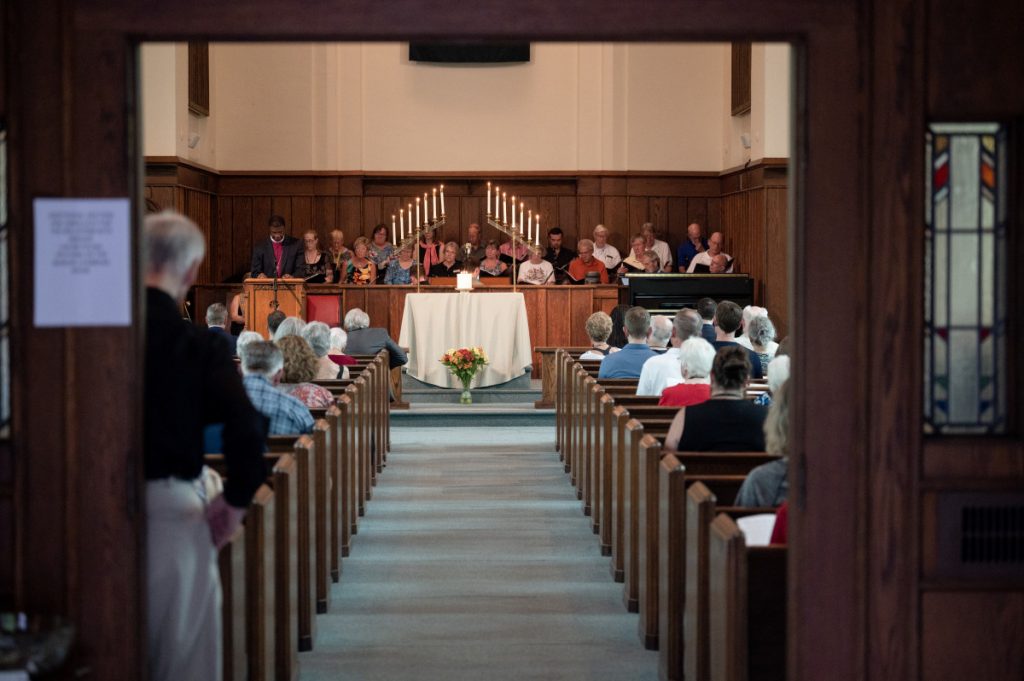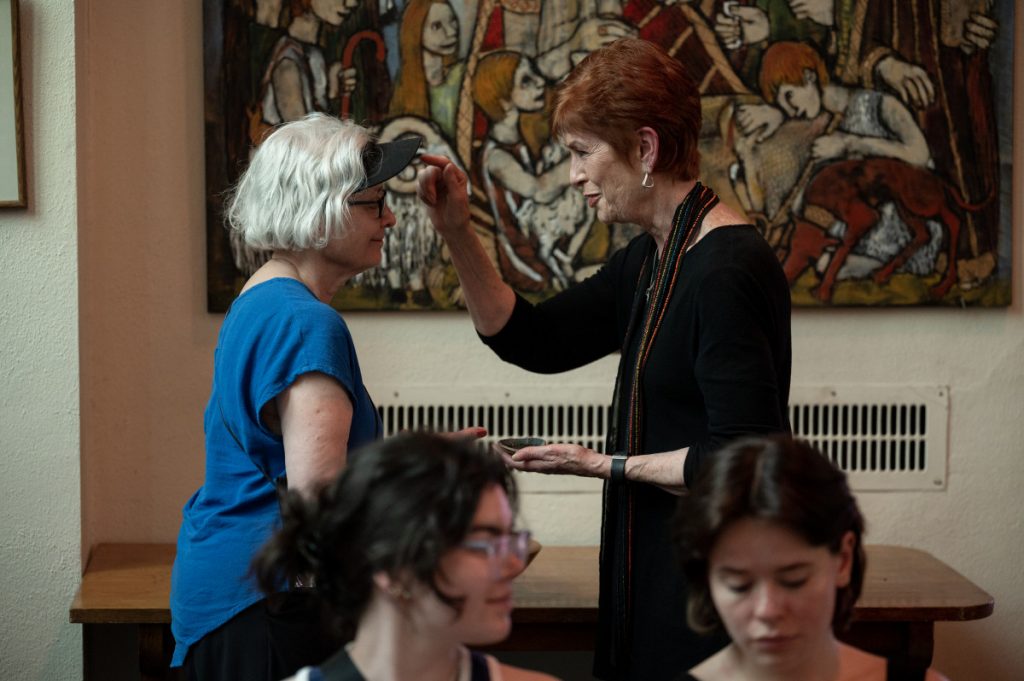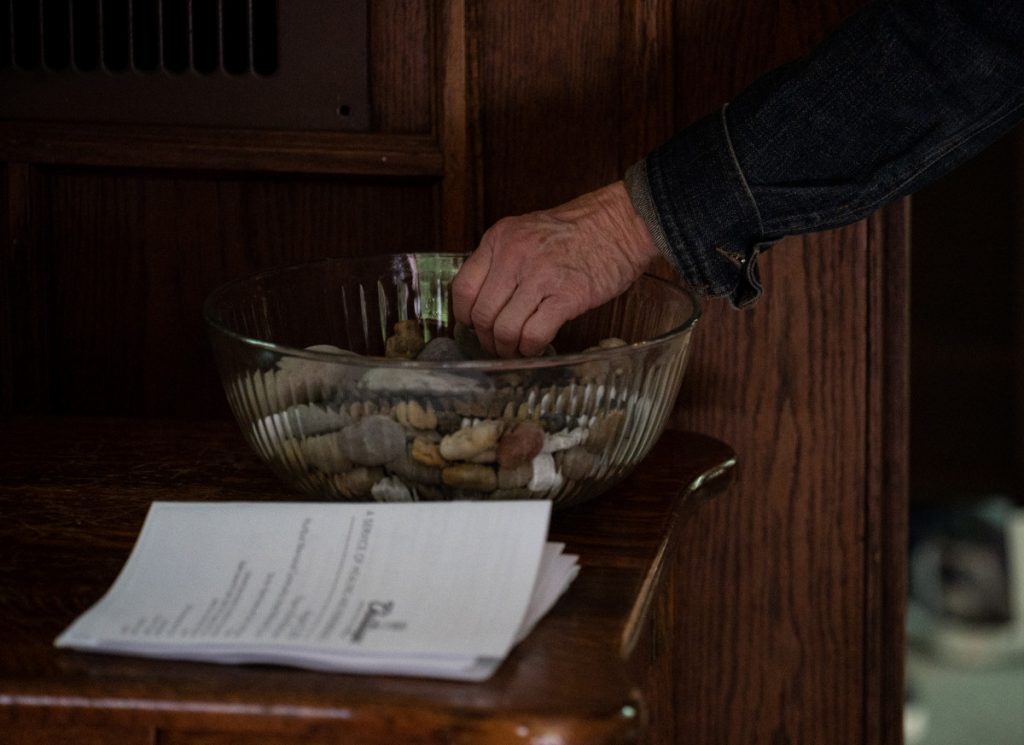
Alyssa Bump
contributing writer
In rays of sunlight glowing through the stained-glass windows of Hurlbut Church, hope and healing illuminated the hearts of Chautauquans.
On the one-year anniversary of the attack on Salman Rushdie and Henry Reese, Chautauquans gathered Saturday in the Hurlbut Memorial Community United Methodist Church for an interfaith Service of Healing and Remembrance.
“To remember means to bring together, to restore to wholeness,” said the Rev. Paul Womack, Hurlbut Congregation co-pastor. “We remember, not to share anguish, but to share hope and to share promise.”
Upon entering the church, attendees were asked to pick up a stone to hold throughout the service. Womack said the stones represent “grief or sadness” carried throughout the past year, as well as “the hopes and aspirations of your heart.”
“In this shattered sacred space, we welcome you for the healing and renewal of all the broken hearts and all the distressed spirits,” Womack said. “We welcome you for remembering the renewal of hope and promise.”
The opening litany, read by Deborah Sunya Moore, senior vice president and chief program officer, reflected on the wounds and burdens Chautauquans have carried with them.
“All of us hold memories,” Moore said, “those that pain us, those that teach us, those that change us, those that name us.”
The congregation then joined together to sing the hymn “We Come to You for Healing, Lord.”
Shahid Aziz provided insight from the Muslim tradition and the Quran.
“Rumi, the well-known poet and Sufi, says, ‘The wound is the place where the light enters you. Healing begins with you,’ ” Aziz said.
Accompanied by the piano, the Motet Choir sang an anthem by Marty Haugen, calling upon the healing spirit to “give strength” and “teach healing.”
Kriss Miller of the Quaker House shared a reading from Carrie Newcomer, Quaker author and activist.
The reading was inspired by a question Newcomer asked her friend Parker Palmer: “What can we do when we are personally or politically heartbroken?”
Palmer replied, “We take sanctuary. We gather with those we love. … We remember, we share stories or we sit in silence until we can go on.”
The choir and gathered Chautauquans then joined in harmony to sing the hymn “Come and Find the Quiet Center.”
Rabbi Samuel M. Stahl said the Jewish tradition speaks about two kinds of healing: refuat hanefesh, healing of soul, and refuat haguf, healing of body. Stahl shared a reading modified from a prayer by Rabbi Naomi Levy.
“Show us how to put our pain into perspective. Teach us to have faith in the new day that is coming,” Stahl said. “For Salman Rushdie, we say: May You, God, heal him, body and soul.”
The hymn, “Mi Shebeirach” by Debbie Friedman, calls for the complete healing of the soul and body. Chautauquans joined together to sing the prayer, calling upon the blessing of “those in need of healing with the renewal of body, the renewal of spirit.”

The Rt. Rev. Eugene T. Sutton, Chautauqua’s senior pastor, said Christian beliefs behold that “woundedness is not the last word, but rather resurrection and new life.” Sutton shared an excerpt from the book The Wounded Healer, by Henri Nouwen.
“Whatever we suffer, we suffer in community with all of humanity and, yes, with all of creation,” Sutton said. “The main question is not, ‘How can we hide our wounds so we don’t have to be embarrassed?’ but ‘How can we put our woundedness in the service of others?’ ”
Once more, the Motet Choir united to perform an anthem written in memory of those who died at Pulse Nightclub in Orlando on June 12, 2016.
Jordan Steves, interim Emily and Richard Smucker Chair for Education, gave the reading for the Buddhist tradition — a tradition he said he doesn’t represent, but still finds comfort in the words from Living Buddha, Living Christ, by Thich Nhat Hanh.
“The seed of suffering in you may be strong, but don’t wait until you have no more suffering before allowing yourself to be happy,” Steves read. “Don’t ignore your suffering, but don’t forget to enjoy the wonders of life.”
The Rev. Natalie Hanson, 2022 interim senior pastor and Hurlbut Congregation co-pastor, and Karlie Robinson, a member of the Amphitheater production crew, came together at the pulpit to read a reflection of remembrance.

“Let us be mindful of the community’s love and resilience,” Robinson said. “Let us be mindful of victims still healing.”
A brief, silent pause followed after each remembrance.
“Let us be mindful of we who are still in pain, who dream nightmares, who watch for sudden movements,” Hanson said. “Let us be mindful of one in prison, awaiting trial.”
Hanson invited Chautauquans to bring their attention back to the stones they selected at the beginning of the service.
“The stone, as we said before, is a symbol today,” Hanson said. “It’s a symbol of everything that we have carried with us and in us since Aug. 12, a year ago, when Mr. Rushdie and Mr. Reese were so grievously hurt.”
The stones, Hanson said, represent several burdens Chautauquans have borne since the attack: fear, uncertainty, grief, fractiousness. Yet, the stones also represent hope.
“For some of us, the stone is the strong presence of gratitude,” Hanson said. “Gratitude for a community that did not break — that was wounded, but did not break — and continues to love and care.”
The stones do not symbolize one specific thing — they represent the complex feelings and experiences associated with trauma.
“Sometimes our stones can be those (emotions) and so many other things,” Hanson said. “You know what your stone means for you.”
To close the service, Hanson led the ritual of stones. She invited those in attendance to decide whether to keep or release their stones.
“You can decide to keep (the stone) to hold the memory of the learnings, wisdom and love you’ve received,” she said. “… (Or) maybe you’ve been carrying some burdens or sorrows, and you’re ready to let them loose.”
Melissa Spas, vice president for religion, Maureen Rovegno, emerita director of religion, Womack and Sutton were stationed around the church to collect the stones and bless attendees.
“You can give up your stone or keep it,” Hanson said. “You can be anointed and blessed, or you can have your stone anointed and blessed, as you wish.”
To gather “in fellowship and as a community,” Hanson encouraged the congregation to gather downstairs for a “feast of friendship, love and community,” prepared by the Hurlbut Church and the Department of Religion.
As Hanson read the closing postlude, a light rain began to fall outside, serving as its own symbol of renewal.
“May you embrace yourself with hope,” she said. “May you embrace the world with hope. May you embrace this community with hope.”




